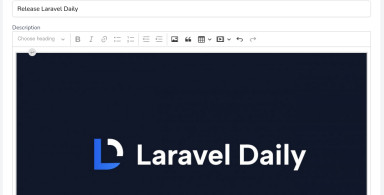For a while many of us used to write conditional queries with "if-else", something like this:
if (request('filter_by') == 'likes') {
$query->where('likes', '>', request('likes_amount', 0));
}
if (request('filter_by') == 'date') {
$query->orderBy('created_at', request('ordering_rule', 'desc'));
}
What if I told you there's a (much) better way? Easily readable and more Laravel-ish. Meet when() method.
$query = Author::query();
$query->when(request('filter_by') == 'likes', function ($q) {
return $q->where('likes', '>', request('likes_amount', 0));
});
$query->when(request('filter_by') == 'date', function ($q) {
return $q->orderBy('created_at', request('ordering_rule', 'desc'));
});
$authors = $query->get();
Looks nicer, doesn't it?
Notice: click here to watch video version of this lesson, in my 2-hour online-course Eloquent: Expert Level
Wait, there's more
In the example below we will filter users only if the role was passed as a request option.
This means - as long as there is no parameter or it's false/null - you will see all of the users but if it becomes a value, lets say "1" for administrator - you will only see administrators.
$query = User::query();
// From Laravel 5.4 you can pass the same condition value as a parameter
$query->when(request('role', false), function ($q, $role) {
return $q->where('role_id', $role);
});
$authors = $query->get();
What about default values?
Bellow example shows third argument to the when method. This closure will only execute if the first argument evaluates as false.
Author::query();
->when(request('filter_by') == 'likes', function ($q) {
return $q->where('likes', '>', request('likes_amount', 0));
}, function ($q) {
return $q->orderBy('created_at', request('ordering_rule', 'desc'));
})->get();
It's not just a prettier way to write the same "IF" but is also a great way to organize conditional queries.
More information about conditional queries: https://laravel.com/docs/queries#conditional-clauses
Here's a pull request for the parameter acceptance (not mentioned in official docs): https://github.com/laravel/framework/pull/18419


-front_grid.jpg)

-front_grid.jpg)
-front_grid.jpg)
Very nice tip, thanks !
Learn something new thank you sir
Actually, no. I don't understand why it's so complicated, to use an additional function where you can just "if ", complicating the readability of the code.
I have to agree with Shino. The only advantage I see to this extra complexity is a reduction of duplicated code when the query chains get very long. Otherwise it's a nightmare for readability IMO, compared to the simple if/else.
Today I learnt something valuable. My query was something like this:
This used to return all of the data. It seemed like this filter was not used.
The important lesson here is, When we directly use $request->min_price, then it replaces the exact value of the min price. And suppose the min_price is 0. Since laravel uses if conditions for when statements, the if condition became false (0). And hence the query was not executed.
The proper method was as to use request('min_price') or $request->has('min_price)
This is actually the best part of this self-promotional piece of original author arrogance (one can safely replace last three words with "shit"). Thank you, Prashant.